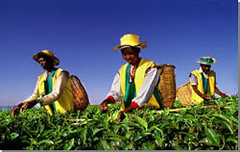
Kenyan tea growers have been on strike in late October 2010. The bosses are saying that the action is not seriously impacting the industry but the work stoppage has gained international attention.
Originally uploaded by Pan-African News Wire File Photos
Reuters
NAIROBI--A Week-long strike by a fraction of workers in Kenyan tea firms is unlikely to affect auction prices and export volumes because the dominant smallholder farms were operating normally, the industry regulator said on Friday.
About 80 000 workers went on strike last Monday in the east Africa nation’s tea farms went on strike over the use of tea plucking machines which they claimed could cost them their jobs.
The industrial action mainly affected tea estates west of the Rift Valley with the Nandi area being hardest hit.
"Except for some factories in the Nandi area, most of the factories in the affected region have been operating normally," Tea Board of Kenya Managing Director Sicily Kariuki said.
"Some level of plucking has been taking place in the affected estates."
The official said the strike was unlikely to have an impact on the industry whose annual proceeds rank as Kenya’s second-highest foreign earner after horticulture.
"In the immediate term, the strike will not have an impact on export volumes and prices at the auction.
"This is in view of the fact that only a section of the plantations sub-sector is affected," she said.
"The smallholder sub-sector, which accounts for about 60 percent of the total production and is the largest supplier of tea to the auction, is operating without interruptions."
A bulk of Kenya’s tea is produced by Kenya Tea Development Agency that caters for the more than 500 000 smallholder farmers. The agency manages 65 tea factories spread across tea growing zones in the country.
The average price for Kenya’s top tea rose slightly to US$3,49 per kg at this week’s auction from US$3,31 per kg last week, while volumes offered were also up, Africa Tea Brokers said on Tuesday.
Kariuki expressed optimism the talks between workers and producers would help avert a prolonged strike that could jeopardise the sector’s projected strong performance in 2010. "We believe on-going engagements will yield a positive outcome," she said.
"The decision of using machines for the picking or not, is purely a business decision motivated by several considerations, both cost-efficiency related as well as socio-economic considerations. TBK is aware that the industry stakeholders are cognisant of the need to balance between uptake of mechanisation and minding the well-being of people within their environs." — Reuters.
No comments:
Post a Comment